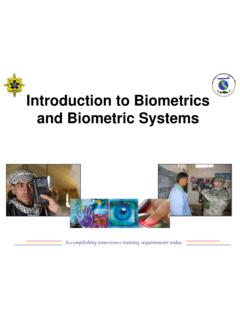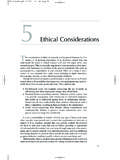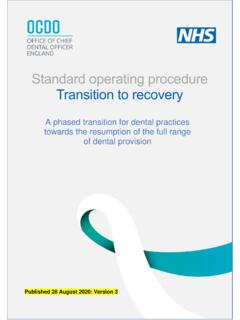Transcription of Vetting Clearance Guidance - GOV.UK
1 National Security Vetting Advice for Vetting Subjects Everyone employed in the Civil Service is subject to recruitment checks of identity, employment history, right to work and unspent criminal record (the Baseline Personnel Security Standard BPSS ). But some especially sensitive jobs require national security Vetting . This document answers typical questions about Vetting . Vetting There are three levels of Vetting : Counter-Terrorist Check (CTC) for people working at high risk sites or in close proximity to certain public figures (form to complete); Security Check (SC) for people who work with SECRET information (form to complete); developed Vetting (DV) for people who work with TOP SECRET information (form to complete and interview).
2 Full details can be found But in essence, Vetting comprises a range of background checks to establish whether an individual may present a security risk because of any associations ( links to organisations hostile to HMG), behaviours ( convictions) or personal vulnerabilities ( substantial indebtedness). The Vetting Process Vetting is only applied where a risk assessment demonstrates that it is necessary, appropriate and proportionate, and the person concerned is content that the checks be undertaken. Any checking process may feel forbidding or intrusive but be assured that: You will be treated fairly and with respect throughout Your information will be kept secure and private.
3 Your information will only ever be shared outside the immediate security team (for example with HR) on a strict need to know basis. For clearances that require an interview this will be at a time and place that suits you. The process is always even handed: it does not allow any bias, make assumptions or imply conclusions. But if you feel anything is unclear or unsatisfactory you can ask for clarification or explanation. You should: Complete forms or provide additional information promptly; delaying Vetting may delay your posting and adversely affect the organisation. Answer all questions honestly: misleading or concealing information can be grounds to refuse or withdraw an existing Clearance .
4 You will be informed of your Vetting decision as quickly as possible. In the event of an adverse decision you will be advised of how to appeal. Do I have to be vetted? No one has to be vetted, though certain jobs require it and this will be clearly stated in the vacancy notice. If you apply for such a post you will need to be vetted but you can change your mind at any time during the process. How confidential is Vetting ? Your information will be handled in complete confidence by the Vetting organisation, and only by individuals in your employer s organisation who are responsible for and trained to manage security matters. Information would only be shared more widely if for example it pertained to any legal proceedings.
5 If you are worried about confidentiality, please contact your Vetting sponsor for advice. UKSV has published a privacy notice that explains who we share your information with, who the data controllers are and what rights you have. It tells you how you can go about raising a query or how, if you are not satisfied with the way in which we are processing your personal data, you can make a complaint. You can read this privacy notice at Do I need to provide medical information? You will be required to complete a health declaration. For access to the most sensitive information (SECRET and TOP SECRET) the Vetting process has to take account of certain medical conditions, for example psychological complaints that could affect an individual s judgment.
6 Again, any medical information will be treated in strict confidence. What financial information will you need? For SC and DV clearances we need to check that you are not carrying unduly large debts or otherwise have a financial past ( living beyond your means) that could leave you open to external pressure like bribery. At DV we will also need to understand how you manage your money and overall household finances to get a complete picture of your lifestyle and habits (by asking for information such as bank account and mortgage statements). Routine debts such as mortgages, loans or credit card bills will not normally be cause for concern.
7 Every case is judged on its own merits. Is a criminal record a bar to security Clearance ? Every case will be considered individually. It is important to be completely honest about any offences you have committed in the past. Having a criminal record is not an automatic bar; we will take proper account of the nature of the offence, when it happened, and if there is any indication of ongoing criminal activity or associations. I have been vetted before do I have to provide the same information again? We are working to improve the user experience, to deliver a more effective digital service. However sometimes we have to ask for the information again, especially if it may have changed.
8 Do I need to be a British citizen or to have lived in the UK to be vetted? Some especially sensitive posts, for example in the Security and Intelligence Agencies, are reserved for UK nationals; and certain categories of information may be restricted to UK nationals too. But generally, nationality is not a bar to security Clearance though to be vetted we will usually expect a reasonable period of residency in the UK so that meaningful checks can be undertaken. Further information is available here: developed Vetted candidates What will I be asked at the interview? The Vetting Officer will want to build up a complete picture of you, so expect the interview to cover most aspects of your life.
9 We have to consider your loyalty, honesty and reliability, and whether you could be at risk of bribery or blackmail. We will ask you about your wider family background (relationships and influences), past experiences, health, sexual relationships and behaviour, drinking habits, experience of drug taking, financial affairs, general political views, hobbies, foreign travel etc. The interview will be searching, but it is not an interrogation and should not feel like one. Some of the questions may feel intrusive, but need to be asked so that HMG can be assured that it can trust you with very sensitive information that you could be actively targeted for.
10 The Vetting Officers are very experienced and will not be easily shocked or surprised so be honest and straightforward. Full disclosure will allow us to properly weigh risks, but withholding or misleading will invariably lead to a Clearance being refused. Where will I be interviewed? We normally carry out interviews at work, during working hours. You may request to be interviewed at home, and the Vetting Officer will try to do this if possible. What documents will I need to take to the interview? The Vetting Officer will provide you with a list of documents and information to bring along, including your passport and financial records. Most should be originals, but we do accept print out of online bank statements.

















